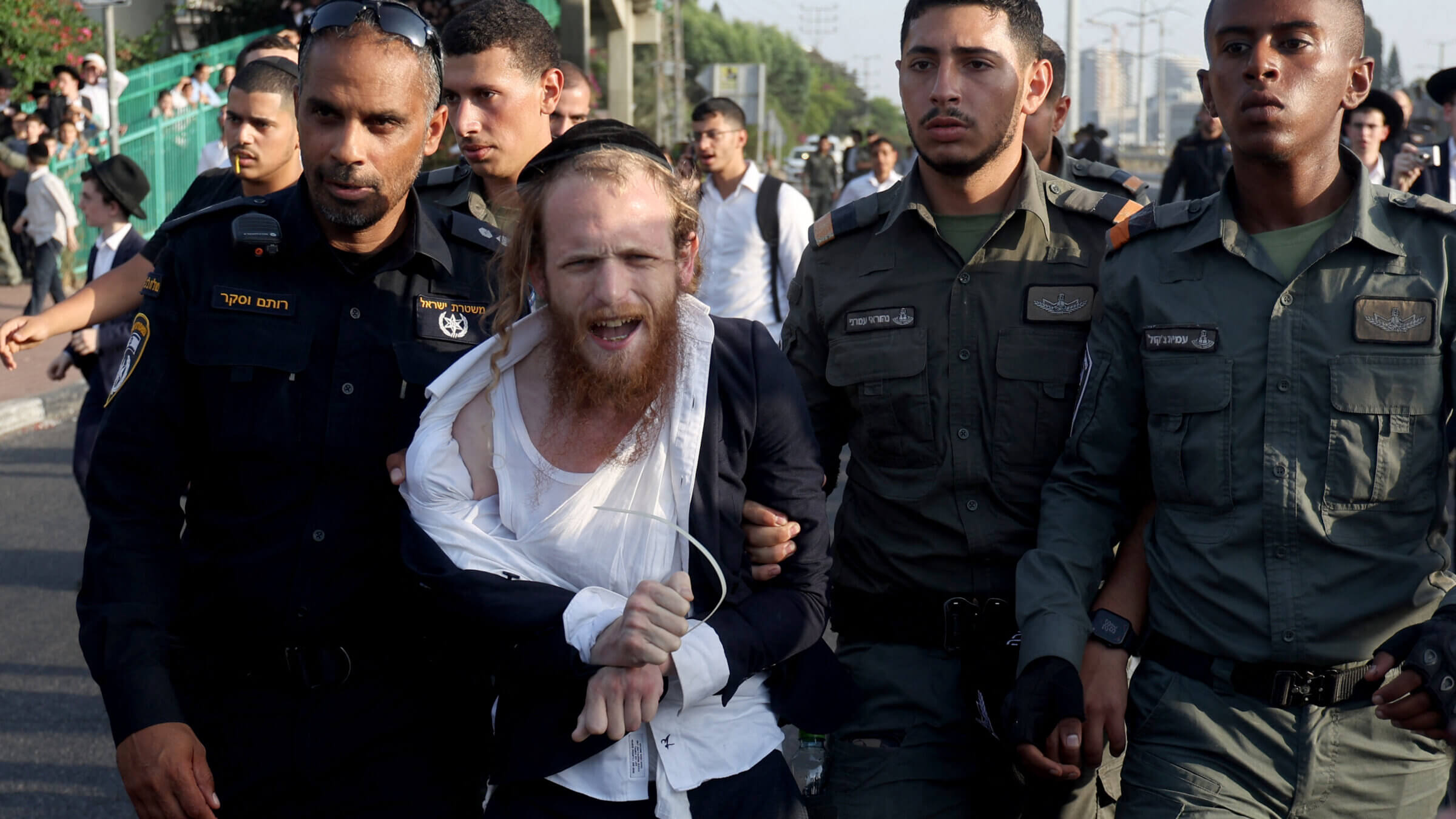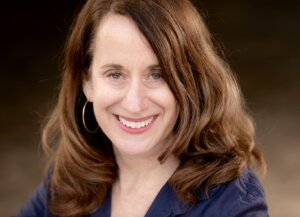
Police detained an Orthodox man in Bnei Brak last week as he protested against the proposal to conscript yeshiva students into the army, which Israel’s Supreme Court ordered on Tuesday. Photo by Jack Ghez/AFP via Getty Images

Susan Greene June 25, 2024
BNEI BRAK, Israel — Members of Israel’s Haredi community are warning of a religious war after the country’s Supreme Court ruled Tuesday that the government must start conscripting yeshiva students into the army.
“If our young people have to stop studying Torah to fight in the army, then our country has nothing left,” said Israel Trabelsi, 70, a Torah scholar and furniture salesman in this predominantly Haredi community in eastern Tel Aviv. “Our people are not going to tolerate that. They’re just going to watch.”
Speaking in French on a shady bench in central Bnei Brak on Tuesday afternoon, Trabelsi said no ruling by a secular court would impede millennia-old Torah study. Like several other men and women I spoke with after Tuesday’s ruling, Trabelsi said “a lot can happen between now and April.”

That’s the deadline set by all nine justices of Israel’s Supreme Court for the government to end an exemption for men who study Torah full-time to serve in the Israel Defense Forces, a loophole that dates back to the founding of the state of Israel in 1948.
Tuesday’s ruling deemed unlawful the government’s decision to postpone the conscription of eligible yeshiva students until June 2023. The ruling ordered the IDF to end government subsidies for these students and begin active efforts to conscript them into military service.
 Joseph Haim, who was putting up signs for local businesses, said Israel relies as much on Torah scholars for security as it does on soldiers. Photo by Susan Green
Joseph Haim, who was putting up signs for local businesses, said Israel relies as much on Torah scholars for security as it does on soldiers. Photo by Susan Green
Joseph Haim, a 65-year-old sign maker, said he was concerned about the spiritual safety of the country, arguing that Israel’s security depends not only on soldiers but also on Torah scholars.
“God will only protect us if we study His Word,” he told me, “and the justice system needs to take that factor into account.”
Ending subsidies to yeshivas “will bring disruption to the lives and families of our community,” Chaim said while overseeing the installation of a sign at a shoe store on Rabbi Akiva Street here.
“In Israel, you have to take money from the Arabs, not from the Jews,” he added.
Like Trabelsi, he expects protests against Tuesday’s court ruling and “possible violence to follow.”
“Jews fight for what they believe in. We have fought and are fighting wars over much smaller things,” he said.
One man who disagrees is Sinai Elmachias, 50, an Orthodox Jewish construction worker and father of 12 from nearby Ramat Gan. He said he served in the military many years ago and showed me scars under his yarmulke as proof.
“Arabs threw stones at me,” he said. “My opinion was that because I served in the army, others should go too.”
Susan Green is a correspondent for The Forward based in Israel. She has been covering news in Colorado for the past 25 years. More recently, she has served as an investigative reporter and coach for journalists across the state. Follow her on Twitter: Follow.

We hope you enjoyed this article, and before you read on, we want to ask you to support Forward, our award-winning nonprofit journalism, in this critical time.
Now, more than ever, American Jews need trustworthy, independent news with reporting based on fact, not ideology. We serve you, not any ideological agenda.
As other newsrooms closed or scaled back, the Forward removed its paywall and dedicated additional resources to reporting from the ground in Israel and across the United States about the impact of war, rising anti-Semitism and protests on college campuses.
Readers like you make it all possible: Become a Forward Member to support our work and connect with our journalism and your community.
Become a Forward member today with a donation of any amount and support our mission of telling the American Jewish story fully and fairly.
— Rachel Fishman Feddersen, Publisher and CEO

